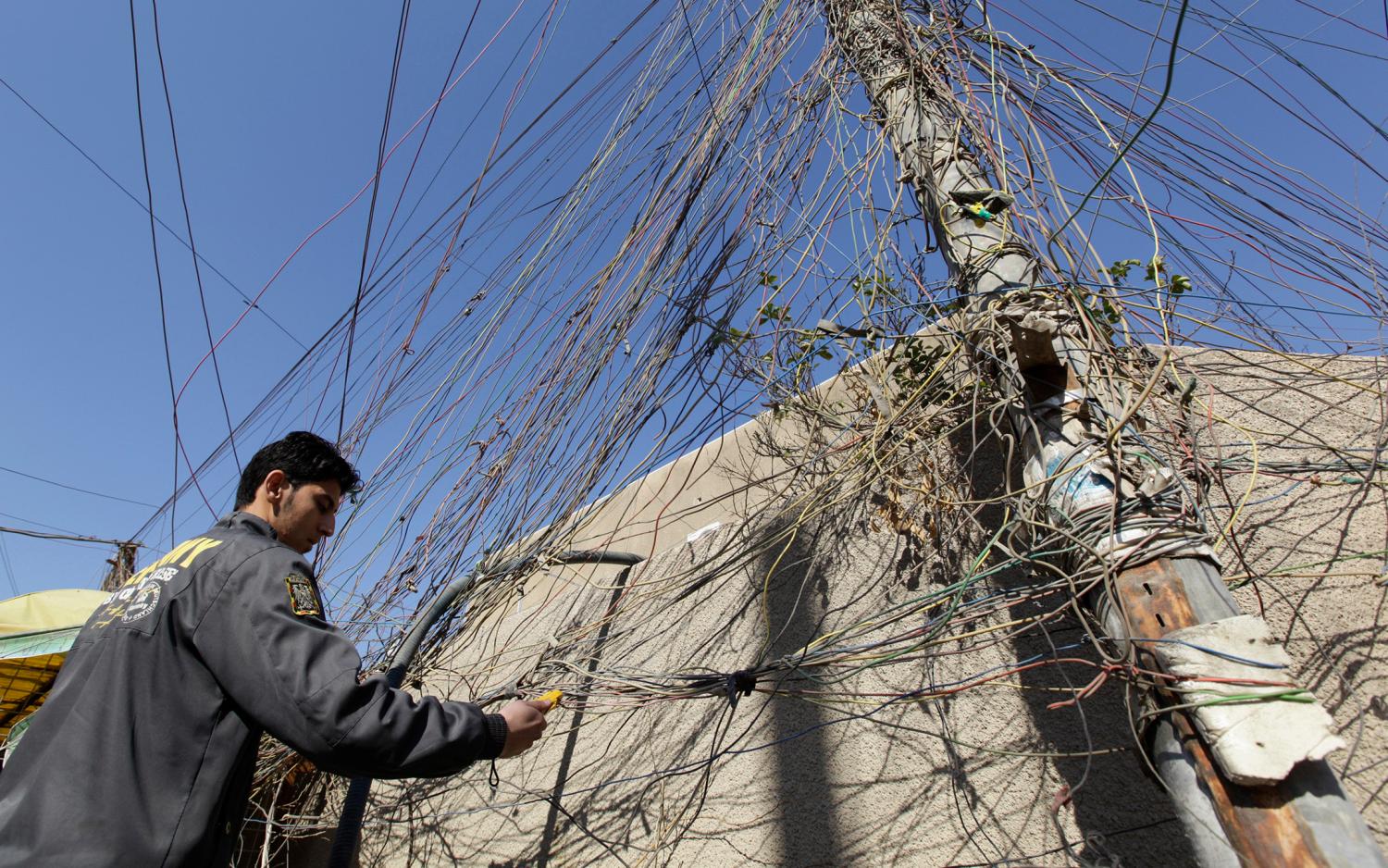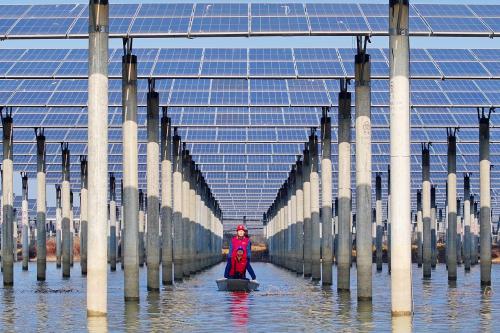Content from the Brookings Doha Center is now archived. In September 2021, after 14 years of impactful partnership, Brookings and the Brookings Doha Center announced that they were ending their affiliation. The Brookings Doha Center is now the Middle East Council on Global Affairs, a separate public policy institution based in Qatar.
Iraq’s electricity sector has been in crisis since 2003, with citizens still facing long hours of blackouts despite the government’s mammoth spending on electricity over the past 10 years. The sector has underperformed in delivering basic services and imposed huge financial burdens on the federal budget. The shortfall in generation capacity was marred by unprecedented load shedding, excessive losses during transmission and distribution, and massive financial shortfalls. The provision of electricity services is an absolute necessity for the future of the Iraqi economy and improved welfare of its citizens. However, an increasing demand for electricity, fueled in no small part by large government subsidies, has been accompanied by a budget deficit in the billions of dollars, making the situation even worse.
Crisis
The decade-long electricity crisis has severely damaged the competitiveness of Iraqi industry and agriculture, imposing a significant social and economic burden on normal Iraqis. Citizens in dire need of electricity have been forced to pay for the output of expensive private generators. Poorer households, lacking funds to cover generator costs, have endured long hours of blackouts.
Clearly, the restructuring of the Ministry of Electricity (MOE) and its personnel—more than 100,000 employees are on the ministry’s staff—is long overdue as the government strives to improve the service and meet future demand. Draft legislation to reform the sector has been on the parliament’s agenda since 2010, but has not yet been adopted. This is due in part to the complexity of the issue, but also as a result of fears of another political fiasco should disagreements arise among various parliamentary blocks. As a result, the draft act has been left in limbo, unlikely to pass before the parliamentary elections next month.
The draft legislation, written 10 years after the MOE was established in 2004, would mandate that future governments proceed with liberalization of the sector. If this happens, it would mark the first privatizations in the electricity sector since the Iraqi government’s initial decision to nationalize Baghdad Electricity and Lighting Company in 1955. The draft outlines new key roles for the MOE, as well as focusing on regulatory policies and other issues such as licensing. According to the draft, the ministry’s 27 directorates will be restructured, corporatized and eventually privatized. However, it does authorize the creation of an independent regulatory entity to oversee the sector, ensuring competitive, effective and transparent electricity market. It is a major concession that the government has finally accepted a role for the private sector in the economic reform of the energy sector, as an essential step toward tackling the sector’s problems.
The minister for electricity, Karim Aftan al-Jumaili, highlighted this role during a recent Dubai conference on Iraqi energy. He outlined a number of investment projects which would bolster Iraq’s electricity-generating capacity from 12,000 megawatts (MW) now to 20,000 MW by 2015. According to his presentation, this would require more than $75 billion worth of investment. The government expects some of this to come from private investors. Funding the MOE imposes a heavy financial burden on government finances: support for the ministry totals $9 billion (6.5 percent of the overall budget) per year, hindering spending on other crucial sectors, including social security, housing, health and education.
While the draft legislation’s proposals for involving the private sector are economically feasible, effective privatization needs an independent electricity regulatory authority in order to guarantee a fair, effective and transparent market. Beyond this, there is also the need for a strategy to frame the deregulating process that combines short-term practical measures to combat shortages and long-term policies which plan for a stable, reliable electricity supply for Iraqi citizens.
The draft act specifies that government-owned entities should be able to finance their own operations in the future. Yet it provides no details as to how this will be implemented. Successful implementation of the reform, though, will depend on those details. Implementation would require politically unpopular steps – such phasing out subsidies, restructuring of government departments and more private ownership. Groups that benefit from the status quo will probably try to hinder such reform. Successful electricity reform needs to be closely linked to Iraq’s Integrated National Energy Strategy, incorporating the principles of diversification, sustainability, social and economic development. Such reform should be based on solid evidence and a careful assessment of the country’s future energy landscape. In theory, Iraq’s various political parliamentary blocks and other stakeholders would easily find a consensus in support of such mutually agreeable technical reforms. In reality, though, various parties have undermined consensus for political gains, weakening the roles of independent institutions.
The extreme polarization of Iraqi political life has expanded beyond security matters, affecting core debates over economic and social development. As the sectarian allegiances of Iraqi lawmakers have hardened since the end of civil unrest in 2008, it is unlikely that any reform effort would gain a majority consensus among the various political blocs. Any such efforts would be subject to hard-hitting negotiations among the lawmakers.
Moreover, the politicization of the electricity crisis over the past several years threatens to inflame any discussion of privatization in the public sector. Policymaking in Iraq has favored short-term gains for political survival over long-term visions. Over the past four years, the council of ministers has repeatedly attempted to adopt economic measures, such as the Infrastructure Law and Oil and Gas Law, only to see them stall in parliament due to political instability, lack of consensus, and the complexity of deal-making. Issues surrounding the persistent political struggle occasionally surface in full view of the public, as was the case in June 2010, when the former electricity minister, Karim Waheed, resigned after growing public outrage. His successor, Raad Shallal al-Ani, was later dismissed over irregular deals and allegations of corruption.
Even if the Cabinet and parliament secure agreement on the adoption of the proposed new legislation, bureaucratic difficulties have in the past hindered implementation due to resistance from the strongly hierarchical structures of the government’s departments and the nature of Iraqi legislation. Framework laws such as the Draft Electricity Act, for example, would typically require further implementing legislation in order to make practical changes on the ground, providing yet another opportunity for political debates between the ministry, the council of ministers, and the parliament. So any true reform would have to run a gauntlet of competing political and economic interests.
Long-term Planning
Such a plan needs to be outlined in a comprehensive legislative and regulatory framework with adequate institutional set-up. Legislative draftsmen need to identify medium- to long-term policy objectives along with means of implementation, taking into consideration future needs across various sectors of the economy. This strategy should be developed through a process of consultation with all major stakeholders, including the council of ministers, parliamentary committees, provincial councils and experts, with clear deadlines for deliberation and implementation.
The experiences of key developing countries in electricity sector reform confirm that governments with weak institutions tend to have poor records of implementation, despite ambitious agendas for reform. In Iraq, identifying technical requirements for electricity reform is only the start of the solution – and even these the various technical options for electricity reform are not clearly stated in the draft act. The process of translating technical plans into politically acceptable measures requires agreement on the overall strategic objectives of reform.
A realistic, long-term solution to Iraq’s electricity problem will need to incorporate political concerns and the expectation of the various stakeholders. Despite these apparent difficulties, though, there are encouraging signs of support for reform efforts.
First, there is a relatively high percentage of the population willing to pay a higher price for electricity – provided quality of service improves along with it. Although the draft act is vague about capping the billing tariff for low-income families, which represent 20-25% of the population, this presents an encouraging sign for phasing out existing heavy subsidies.
Second, the timing of the phases of electricity reform is critical, especially when the issues of privatization and increase in tariffs are addressed. The timeframe for a comprehensive sector reform usually runs long, between five and 10 years, and generally takes even longer in the Middle East. The highest policy priority in the electricity sector should be rebalancing the structure of tariffs, realigning prices with underlying costs over the next 10 to 15 years. This will partially restore revenue adequacy and generate internal funds for capital investment, while working to eliminate poorly targeted and inequitable subsidies.
The logical place to address revenue shortfalls is at the distribution end. One method would entail the creation of retail companies, disconnecting them from the rest of the monopolized industry by separating them from distribution companies. These retail companies could then be subjected to price or revenue cap regulation, with an explicit commitment from the government that it will refrain from interfering in the tariff determination process.
The draft act implicitly calls for gradual reforms, similar to those that have been successfully implemented in countries with mature electricity systems with the full support of well-functioning institutional arrangements. However, a gradual approach to electricity reform may not be the right prescription for a country that is already in the midst of a severe power shortage, affected by poor operating efficiency as well as poor management, and suffering from high technical and non-technical losses. In the face of such severe performance problems and the serious mismanagement of the sector, far-reaching reforms based on radical structural options may constitute a sensible, even conservative response to Iraq’s electricity crisis.
The Brookings Institution is committed to quality, independence, and impact.
We are supported by a diverse array of funders. In line with our values and policies, each Brookings publication represents the sole views of its author(s).




